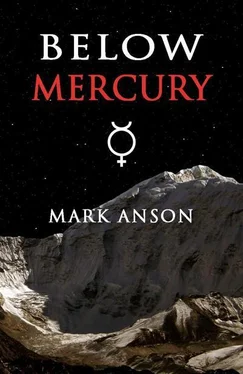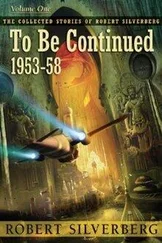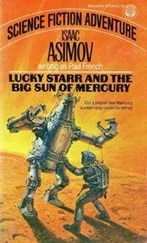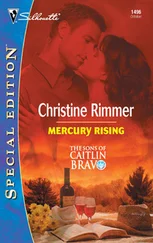‘Oh, no no no,’ Matt said, trying to push his seat backwards in an involuntary response to the power array racing towards them.
‘You fucking, bastard, machine, get off my fucking ship ,’ Clare hissed, her eyes aflame, and ploughed the landing leg straight into the solar power array.
The shuttle lurched sideways with an enormous bang, throwing Clare and Matt into their seat straps, as the heavy power array structure ripped the entire landing leg from the body of the craft.
Circuit breakers banged inside the cockpit as the power array short-circuited, overloaded, and blew apart in an explosion of violet flashes and glittering shards of glass.
The shuttle broke free, rising up and away from the mountain peak. Behind it, the robot spun over the edge of the great outthrust peak in a shower of debris from the shattered power array, and fell. It tumbled as it fell, spinning down, down, towards the darkness of the crater that awaited it.
The robot’s red eyes looked upwards one last time as it turned in its fall, and for a moment, they seemed to watch the shuttle as it climbed away, rising into the black sky. The robot’s limbs moved in a last, futile attempt to reach out and save itself, and then it plunged out of the sunlight into darkness, and was gone.
Aboard the shuttle, Clare fought to control the craft’s attitude. One set of thrusters had been torn away, and the controls didn’t respond properly. She managed to steady the spinning shuttle by trial and error, until it settled out into its climb.
She cancelled the alarms that warbled for her attention in the cockpit, and reset the circuit breakers. The shuttle’s systems gradually came back on line, and she reset the autopilot for the climb to orbit.
They watched with relief as the white line of the shuttle’s path moved back towards the magenta curve of their required climb.
‘Can we make orbit?’ Matt asked, rubbing his neck where it had been wrenched sideways by the impact.
‘I think so. We’re lighter then planned now; the climb was planned for six people on board.’ She looked back at Matt, her expression stricken, as she realised what she had said.
She looked frightened and vulnerable.
Matt reached out, took her hand, and held it tight.
‘You did great,’ he said, smiling, and after a moment’s hesitation, she squeezed his hand back, hanging her head as the tears came. She wept for the loss of her crew, her ship, and everything else that she held close, for all the people who had died in the darkness of the forgotten mine, and for the horror of the silo.
‘I thought it had got us,’ she said through her tears, ‘I thought we were going down.’
Matt said nothing, but unfastened his seat straps and leaned over to hug her, and it was quiet in the cabin; the engines hissed in the vacuum of space, propelling the little craft higher and faster, heading for the rendezvous point with the space tug.
They could just make out the brilliant star of the tug’s reflective sunshade in the distance. It moved against the stars, growing larger with each passing minute.
They didn’t say a word as they held each other during the long climb; each was too busy with their own thoughts, and the terror of the mine was too close behind them.
The surface of Mercury dwindled to a distant landscape, and then to a curved horizon, and finally to a planet in space, turning beneath them.
Clare reached out and triggered the automatic docking sequence, which would bring them to within manoeuvring distance of the tug. She did it automatically, her hands moving almost of their own accord, while her mind took shelter far away.
‘We’re going to have to send a report as soon as we’re on board,’ she said at last. ‘I’m looking forward to the reaction when we tell the FSAA what we found there.’
‘They’ll never believe us,’ Matt said flatly, looking into her eyes. In the subdued lighting of the flight deck, her pupils were very large.
‘Oh, I think they will.’ She spoke softly, but her voice was certain. ‘Everything that happened in the silo is in the flight recorder, and I’ve got the spaceplane’s last few minutes right here.’ She tapped the memory module hanging round her neck.
‘Oh, you beauty,’ Matt said, grinning. ‘Will you let me help compose the message?’ Their faces were very close.
‘I’ll think about it,’ she said, and pulled his face towards hers.
Mercury
In 1610, the Italian astronomer Galileo Galilei (1564–1642), who would later be forced to recant his scientific beliefs in the face of a wrathful Church, observed Mercury for the first time with a telescope, and saw that it was a planet, a distant world in space.
In 1629, Johannes Kepler (1571–1630) predicted a transit of Mercury across the Sun for 7 November 1631, observable from Europe. Kepler died a year before he could witness the event, but three scientists in Europe were able to observe the transit, including Pierre Gassendi (1592–1655), who used a projection of the Sun through his telescope to see the event on a white screen. In a report of the transit, Gassendi wrote:
‘Crafty Mercury wanted to pass by unnoticed; he had come in earlier than expected, but could not escape without being discovered; I found him and I have seen him; something never experienced by anyone before me; on November 7th, 1631, in the morning.’
Edmond (Edmund) Halley (1656–1742), who later had a comet named after him, was the first to realise that Mercury transits could be used to measure the distance of the Sun, thereby establishing the absolute scale of the Solar System from Kepler’s third law.
Johann Schröter (1745–1816) produced the first crude maps of Mercury, but it is hardly surprising that they were not of a high quality, given the extreme difficulty of observing the planet. Mercury rarely strays more than a few degrees from the Sun’s disc, so that it can only be seen for a few minutes after sunset, or before sunrise, at certain times of the year. Even to prepare these simple maps must have taken years of patient observing using the telescopes of the time, waiting for the few moments of clarity in which faint surface features could be distinguished.
Centuries later, we know much more about this tiny world that fleets by, so close to the Sun. The robot explorer Mariner 10 was launched towards Mercury in November 1973, making the first use of the ingenious ‘gravity slingshot’ manoeuvre to place it into an orbit that passed the planet repeatedly. Mariner 10 made three flybys over Mercury between March 1975 and March 1976, and mapped more than forty percent of the planet’s surface. Much of our knowledge of Mercury was gained from this hugely successful mission.
The difficulties of getting to Mercury cannot be over-emphasised. Any object orbiting the Sun, for instance a planet or a spacecraft, has a certain amount of kinetic energy (from its orbital motion) and potential energy (from its distance from the Sun). A spacecraft ‘falling in’ towards the Sun changes some of its potential energy into more kinetic energy, so that by the time it arrives at Mercury it is travelling very fast indeed. Huge amounts of rocket power have to be expended to slow the craft down sufficiently to be captured into orbit around the planet.
Mariner 10 was not designed to enter orbit round Mercury; it travelled too fast and lacked a rocket motor powerful enough to perform an orbit insertion. The Messenger probe, however, launched in August 2004, successfully entered orbit round Mercury in March 2011. After a complex and ingenious journey involving multiple flybys round the Earth, Venus and Mercury to slow itself down, Messenger was able to use a comparatively small rocket engine to insert itself into an orbit round Mercury. This was a truly astonishing achievement, a journey of nearly eight billion kilometres, lasting over six-and-a-half years.
Читать дальше











